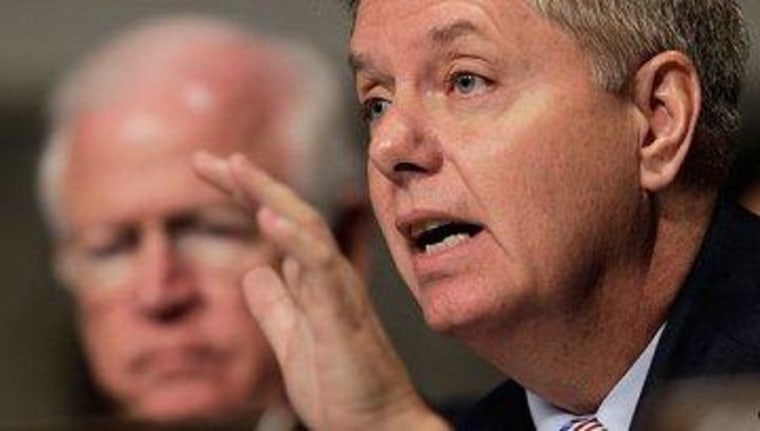For many Americans, President Obama's speech on national security yesterday was long overdue. The president effectively presented a vision to end the nation's post-9/11 war footing -- rejecting the notion of perpetual war, repealing the AUMF, emptying the Guantanamo detention facility, ending subpoenas for reporting, and improving oversight of drone strikes.
It was a big, bold move, and with the proper follow-through, yesterday may well prove to be a turning point for the nation. And within a couple of hours of the speech, one thing was clear: some notable Republicans really didn't care for it.
The top Republican on the Senate Intelligence panel, Saxby Chambliss of Georgia, dismissed the speech as rewarding detainees at Guantanamo who are carrying out hunger strikes."The President's speech today will be viewed by terrorists as a victory," Chambliss said in a written statement. "Today's speech sends the message to Guantanamo detainees that if they harass the dedicated military personnel there enough, we will give in and send them home, even to Yemen."
As Josh Marshall joked, "Who could have imagined that a Senator who came into office on a commercial morphing his opponent into Osama bin Laden would declare Obama speech a victory for terrorists."
That's a good line, and it reinforces a larger truth. Those who were following politics in the Bush/Cheney era will no doubt recall a cliche that was used a little too often: if we do _____— then the terrorists win. Republicans used it with great sincerity for many years, using it to condemn just about every Democratic idea on national security and the use of military force. It became easier to rely on the cliche -- using it to stifle dissent and debate -- than to engage in a serious exploration of foreign policy wisdom.
In time, the line of thought became more of a punch-line than a position, but Chambliss' knee-jerk reaction to the president's speech suggests some of his opponents remain stuck in the past. For many Republicans, it is, and will always be, 2002.
And it's not just Chambliss.
Sen. Lindsey Graham, R-S.C., told reporters afterward that "there are parts of this speech that I could've given." But Obama's overall view of the war is wrong, Graham said, adding that the president's policies would make the country less safe. "The enemy is morphing. It is spreading," he said. "There are more theaters of conflict today than there have ever been. Our allies are more afraid than I've ever seen; our enemies more emboldened." [...][A]ppearing at the same news conference with Graham, Sen. Kelly Ayotte, R-N.H., said Obama's stated desire to repeal the 2001 authorization shouldn't even be considered.
So ... perpetual war forever?
The skeptical reaction from the usual suspects does not surprise anyone, of course, and I suspect the White House expected GOP skepticism. But therein lies the point: there hasn't been much of a debate on these issues, and the president's speech should renew the discussion in (hopefully) constructive ways.
The status quo is unsustainable and Obama has a vision for a smarter way forward. If Republicans have a credible alternative, great. Let the debate begin.
